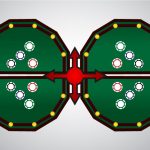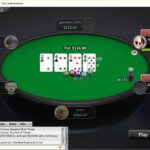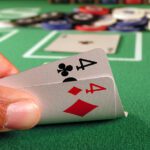From now on every Friday I will be taking some of the strategy discussion from the forums, sum up some of the cool content in case you missed it, and make my own comments on the issues discussed.
In the high stakes forum this week, there was a hand posted by pocketfours where he called a reraise with 44 UTG and was faced with a decision on an 877 flop.
Seat 3: SB ($919.15 in chips)
Seat 4: BB ($1,013.00 in chips)
Seat 6: HERO [ 4D,4S ] ($974.00 in chips)
Seat 10: BUTTON ($2,603.30 in chips)
ANTES/BLINDS
SB posts blind ($5), BB posts blind ($10).
PRE-FLOP
HERO bets $35, BUTTON folds, SB folds, BB bets $113, HERO calls $88.
FLOP [board cards 7C,7D,8D ]
BB bets $136, HERO…?
Sauce swiftly came in and said that p4s should have folded preflop, and as played folded flop. Some other posters came in and as a group decided that floating (calling a flop bet to take the pot away on the turn or river) would be better than raising. P4’s disagreed , as well as gabe who thought raising was a better option.
p4’s said
There is $387 in the pot. If I raise to $300 I only need to take the pot down 43% of the time, and since my preflop reads (range assessment) tell me that he will fold 65% of the time, this should be profitable with a good margin. Actually my read is that his cbet is weak and I expect to take this pot down 80% of the time.
gabe said
also i like raising alot more than calling
This statement by p4’s is pretty lofty. First off, p4’s raised UTG, and opponents normally don’t threebet someone very much if that’s the case. However, p4’s did also say he was threebetting a ton, which means we can expect a somewhat looser range than most are used to. Maybe something like AQ+, TT+, and KQ, 54s-98s, 22-77, and maybe some junk sometimes. IMO, that is not super tight by any means but still pretty tight. That being said, 877 board with two diamonds isn’t one where our opponent is going to cbet a ton, for a few reasons.
1. We raised UTG and called a raise, which normally signifies a tight and strong range.
2. This is a drawy board so if he bets he is going to get shoved on a lot.
That being said, I wouldn’t expect our opponent to be cbetting a ton, and would likely be mixing in a lot of checks and bets, so when he checks we’re not absolutely positive he has nothing, otherwise we’d take it away from him every time. However, p4’s felt like his opponent was cbetting indiscriminately, so we need to take that into consideration as well.The problem I have with floating is we may get two barreled a lot because calling is such a weak play on this board. It’s vunerable, we like to raise draws on it, and therefore we’re going to want to raise our overpairs and sometimes 7’s on it. When we call a good hand reader is going to put us on a weak hand we don’t want to take to showdown, and be much more aggressive because of it.Back in the thread, the discussion changed when gabe swarmed in and said “I call preflop all day but fold flop.” This, of course, spurred a big argument between posters. Some believe that play is okay, but some believe it is surely –EV. The math has been attempted before.
This old Fnord thread shows some good math on it, however it makes an assumption that our opponent has an overpair every time, which is impossible to say. Likely threebet ranges often include hands like AK/AQ, KQ, maybe even some suited connectors or junk hands. You may say “Well this makes it better for us doesn’t it? Because we are beating AK/AQ and unpaired hands already!” You may be surprised, as I pointed out in the thread, that isn’t the case. The explanation only requires a brief explanation of game theory.So let us say for some reason we are playing HU with 36bb stacks. We raise preflop with 44 3.5bb, and get reraised to 12bb by our opponent. We decide to call. Pot is now 24bb and the flop comes an innocuous 952 rainbow and our opponent shoves the rest of his stack of 24bb, exactly the size of the pot. We think he is shoving every hand he reraises.Now let us consider a few ranges. First, we consider that our opponent is only reraising TT+. If that’s the case we want to fold, we are never ahead and are about 8% to win if we call. We need 33% to make it a call. Now let us add AK to that range. Well now we are ahead about 1/4th the time (There are more combinations of AK than pocket pairs) but when we are ahead AK is 25% to win, while when we are behind we are 8% to win. So given an equity estimate, we still should fold, just barely, even though we are ahead sometimes. Now if we add AQ to the range, we should call that shove. But as we add deeper stacks, say 100bb, we are much worse off, as if we call the flop bet, he can draw us out, but he can also mix in another barrel a small % of the time so we still need to fold, using the same technique he used when we had 36bb stacks. Also, now when we hit our sets we have worse implied odds, as most of the time when we put our chips in, our opponent is going to fold with an unpaired hand.So we are worse off in the sense that villain is successfully bluffing us with more hands he is playing, as if even if he bluffed less it would not make a difference! This may be somewhat confusing, but if you would like it explained better read the game theory section of Theory of Poker.Okay, so now we know why even though our opponent has a somewhat loose threebet range, it still isn’t a strong factor to make us want to call. Yet, another argument people make for calling pocket pairs preflop to this raise is the idea that “I can bluff them postflop to make up for it.” Well, again, this thought process is also flawed.Some of you may have read this post by Sauce
P4s- if u wanna slow this guy and his absurd cbetting % down, dont pick 44 to do it with. you are flopping “big” like 1/7 of the time and id assume that leaves u move making 3/7 of the time or so. this seems kinda gross as id imagine that if this guy is cbetting so often hes going to get it in mid-pair/gutterball type light in the attempt to compensate for his mistake at least partially (tho he of course wont think of it like this).
So call his 3bets with hands like 54s-AKs, KQo+, 68s-T8s and various suited broadway combos. you are going to flop big enough to get the last 1.5 PSB after his auto-cbet way more than often enough to be profitable. playing against his ranges with 44 is just letting his unsound strategy exploit you a large % of the time under the guise of “playing back”.
And this post by me.
The problem with pocket pairs is the great disparity in equity versus made hands they have when they hit versus when they don’t hit.
As Sauce and I both wanted to point out, playing back with a hand like 44 is going to be very tough for a few reasons.
1. You don’t flop big enough.
The only way to flop big with a hand like 44 is to hit a set or flop a straight draw. However, with a hand like 76s we flop a big made hand about 5% of the time, about half as much as pocket pairs, yet we also hit a flush draw or open ended straight draw 20% of the time. With both of those draws we are happy to raise and call a shove for just a bit more. So when we do play back with 44, it is going to have to be on a board that likely missed out opponent, which brings up another point.
2. When you don’t flop a set and want to bluff, you are close to drawing dead against villains calling range.
If we choose to raise (and in threebet pots if we do we are going to be very close to committed), and we call a shove we have horrible equity. It’s a pretty self explanatory concept but it’s very hard to make close to pure bluffs profitable, as they have to work very high percentages of the time to be good. And in spots where our opponent expects us to be bluffing sometimes, such as raising a cbet in a threebet pot, achieving those high percentages are very unlikely.So, in conclusion, I believe that 44 is a fold preflop. Now, gabe is a superb hand reader and player, and also has a much looser and aggressive image than most. Given his game and skills, calling with 44 here may be good. But for most it is likely not. However, I think most agreed that folding the flop is better than floating or raising. Hopefully now you can understand a little more why that is!
Submit your review | |









